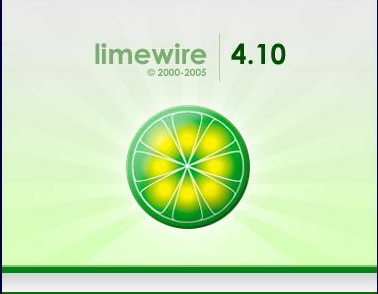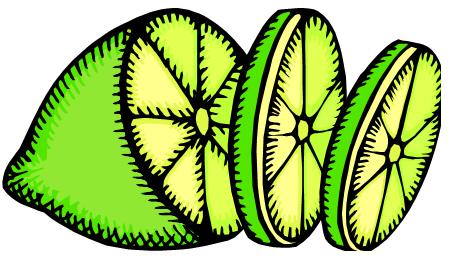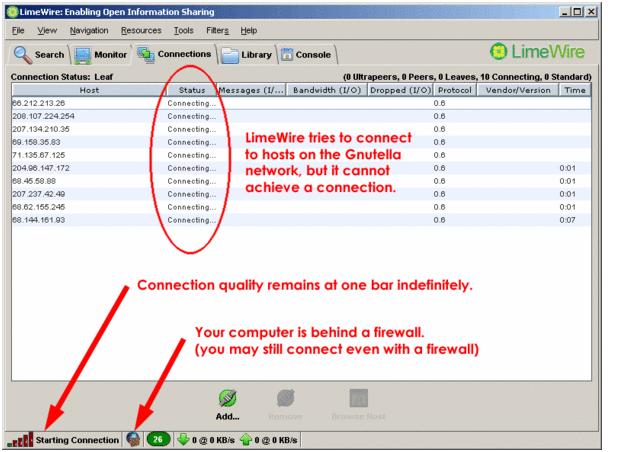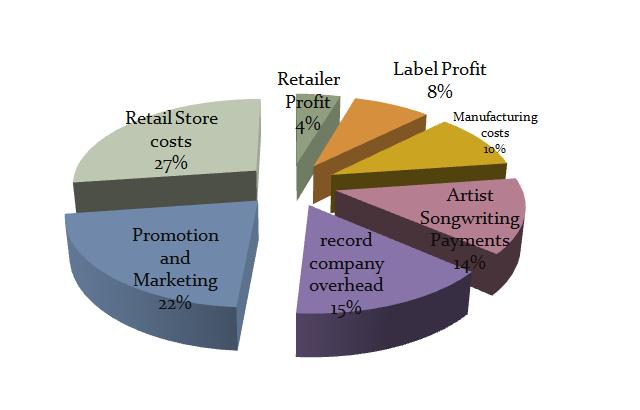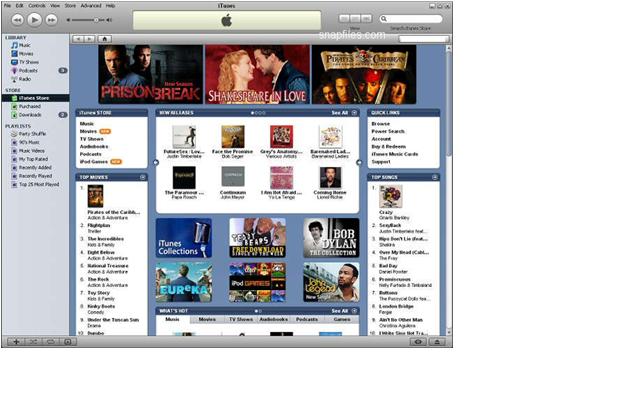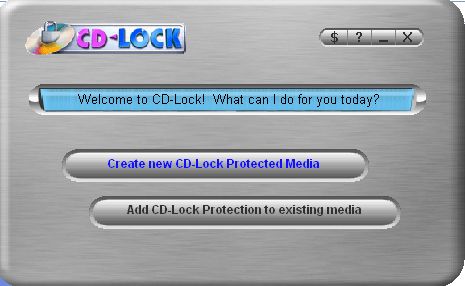T34 Group 2
Contents
- 1 What's Sour with Limewire?
- 2 What Is Considered Illegal Downloading?
- 3 Important Vocabulary
- 4 How Was Limewire Developed?
- 5 How Does It Work?
- 6 The Sweet and The Sour Aspects of LimeWire
- 7 Who Does It?
- 8 Who is affected by illegal music downloading?
- 9 What incentives (if any) encourage ethical consumer practices?
- 10 What are the legal alternatives and are any of these alternatives free?
- 11 What Are The Consequences Of Using Limewire?
- 12 What Is Being Done?
- 13 Conclusion
- 14 References
What's Sour with Limewire?
Group Name What's Sour with Limewire?
Group Members
Daniel Davies
Lara Van Der Breggen
Laila Fidai
Melissa Morrisey
Jordan Wenzlawe
Mission Statement This ethical dillemma created by technological innovation making free music downloading accessible to all, provides the basis for our research project. Although this technology is appealing to consumers, it also poses some ethical questions of the users, which undermine this technology by deeming it unethical. Our goal by completing this project is to make users aware of the consequences of their actions as well as to provide a background of this practice and alternative methods to satisfy this consumer drive.
Argument In the new age of technology it has become increasingly easty to not only get a hold of information, but to access music as well. No longer do C.D's dominant the music sales, they have been replaced with online music stores. As music becomes more and more accessible the temptation of illegally downloading music is at an all time high. Why pay for songs when they are just a free click away?
What Is Considered Illegal Downloading?
Illegal music downloading is known as music piracy which is any form of unauthorized duplication and/or distribution of music including downloading, file sharing, and CD-burning. Limewire does just that, it promotes music piracy by allowing individuals to share, distribute and duplicate music files
Important Vocabulary
Copyright- The principle that the work one has created belongs to the creator and should be controlled by them is as timeless as it is global. “Copyright” is a term of intellectual property law that prohibits the unauthorized duplication, adaptation or distribution of a creative work.
P2P-Peer-to-peer is a communications model in which each party has the same capabilities and either party can initiate a communication session. It is an application in which users can use the Internet to exchange files with each other directly or through a mediating server.
MP3-Is a standard technology and format for compressing a sound sequence into a very small file while preserving the original level of sound quality when it is played.
How Was Limewire Developed?
• LimeWire is a type of peer-to-peer sharing client designed in the Java programming language
• The company was founded in 2000 under the name Lime Wire LLC
• LimeWire was considered to be a step up from the previously popular Napster
• In early 2001, Napster was ordered in court to eliminate file sharing of most copy written material and since then has been losing users.
• Because of this, LimeWire gained a lot of support and downloads from people who were searching for an alternative to continue building up their media libraries for free over the internet
How Does It Work?
• When you search for a file (song, video, etc.), you are searching LimeWire's database for that song to be in someone's shared folder on their computer. When you download the file, LimeWire transfers the file from their hard drive to yours over the internet
• The peer to peer network allows for no central server that stores data instead the data is stored on several computers that have the LimeWire software installed. Say if you were to download a file your computer would act as the client and the computer in which your downloading from acts as the server
• These files may contain viruses, spyware, and other forms of malicious content. Be very cautious when using any peer-to-peer sharing services.
The Sweet and The Sour Aspects of LimeWire
Pros ( The Sweet Side)
-Free Music
-Excellent, resourceful way to get updates on artists music
-Artists receive extra recognition through the distribution of their music
-People are more likely to buy an album or go to a concert if they are exposed to the artists music, and like it
-Majority of Artists revenue comes from their songs being played on the radio, as well as concerts and tours, the sale of C.D’s is the Artists lowest source of income
-Easy to find rare or difficult to find songs
Cons (The Sour Side)
-Even though C.D sales are an artists lowest source of income they still lose money if they don’t sell C.D’s
-the major issue of copyright infringement
-when downloading songs people are often downloading a variety of unwanted additional software
-this results in annoying pop-ups, and viruses along with other computer problems
Who Does It?
In North America surveys have shown that 78% of the illegal downloading that occurs is done by individuals between the ages of 12 and 24. In a survey conducted which compared the ages of those who download with the general population, it has been found that 60% of individuals who are 18 - 29 years old are willing to download music off the internet without paying compared to the general population which found only 29% of the general population would be willing to download music without paying for it.
Who is affected by illegal music downloading?
Illegal music downloading affects a number of different parties. The main ones are the artists, the label, the recording company, the marketing company, and the retail stores. The Canadian Recording Industry Association has broken down what the profit figures are for the sale of one CD in Canada is :· 4% is retailer profit
· 7% is label profit
· 9% is manufacturing costs
· 12% is artist and songwriting payments
· 12% is record company distribution, sales & overhead costs
· 13% is promotion and marketing costs
· 19% is recording, video and production costs
· 24% is retail store costs (the shipping and processing costs)
Illegal download has resulted in a loss of sales of approximately 250 million dollars in the last 3 years. This means that all of the parties listed above were affected.
However many artists and musicians are now saying that the internet downloading is helping to increase the sales of their music. Eighty seven percent of artists and musicians are now using the internet is promote, post and advertise their music and eighty three percent are actually providing free samples of songs to their fans.
What incentives (if any) encourage ethical consumer practices?
To combat the loss of consumer demand to free illegal music downloading on Limewire, retail chains such as HMV have created marketing campaigns that appeal to consumers by lowering prices, offering promotional discounts as well as product bundles (2 for 1 deals). Industry lables are also offering exclusive features associated with an artist or band label such as remixed compositions of songs, album covers with lyrics, artist insight etc. These additional features can only be accessed by consumers who purchase in store CDs or songs and entire albums through legal downloading.A specific Artist, Radiohead, has introduced a unique approach to encourage consumers to attain music legally. In 2007, Radiohead announced that their new album "In Rainbows" would be accessible on iTunes without any sort of fixed rate. Consumers are given the choice of whether or not to purchase the songs and for how much. This new consumer practice sparks an interest and demand for the product, and encourages consumers to provide whatever monetary consideration they feel is adequate.
What are the legal alternatives and are any of these alternatives free?
The legal alternatives for attaining music include purchasing albums in store, purchasing song/albums online and limited online streaming.
Unfortunately all of these alternatives require the consumer to make a purchase, however due to the temptation of free illegal music downloading on Limewire, these products are being offered at a much lower price than has previously been recorded.
Live online streaming provides the means by which to listen to single tracks for free up to a maximum number of plays. Once the maximum has been reached, the consumer is given the option to purchase the track at a minimal price or continue free streaming of other tracks. This strategy stimulates high consumer exposure to products, thus stimulating future demand and purchases.
One intriguing new technology that is most effective in encouraging legal downloading is a new concept that has been introduced by the CEO of MBopDigital.com, whereby the music industry "pays" music fans for legal downloads. The concept works on the basis that first time users of this potal (MyMusicReturns.com), recommend this alternative to others by sending a link. If this link is accessed and sparks a buy, the invitee will recieve a share of the industry's profit.
What Are The Consequences Of Using Limewire?
There are two main ways you can be persecuted for illegal downloading. You can either be taken to criminal court and/or sued in civil court. In a criminal court first time offenders can face up to five years in prison and/or fines up to 250,000 dollars. Or Copyright holders can sue you for 150,000 dollars per copyright infringement. In civil court not only do you have legal fees to pay you can be sued a minimum of 750 dollars per song. So if you have downloaded a lot of songs that can result in millions of dollars in fines! Also a less severe consequence of using Limewire is the potential to get not only unwanted software but also harmful computer viruses. These viruses can slow down your computer or even stop it from functioning.
What Is Being Done?
With the constant development of new file sharing programs such as Limewire, there is an ongoing battle to try to combat illegal downloaders. Some record companies have started to encrypt their compact disks so that they cannot be copied onto computers. The only problem with that is that people who want to put CD’s that they have legally purchased onto their MP3 devices can’t. Another action being taken is the actual shut down of sites that distribute songs. This hasn’t happened to Limewire yet, however a good example of this was the old Napster. Once one of the prime places to get free songs it soon faced huge legal battles along with millions of fines due to copyright infringement. After this Napster ended up shutting down. Also millions of dollars have been spent lobbying congress for more actions to be taken. A prime example of this is what has recently happened in the United Kingdom. As of July 25, 2008 the British Phonographic industry ( that represents the UK’s major record labels) got an agreement from the biggest internet service providers to go after people who are illegally downloading music. The deal was that every week the BPI would write 1000 letters and send these warning letters to those who are illegally downloading, noting that the individuals actions are being acknowledged. Unfortunately no settlement has been reached as to what actions should be taken towards repeat offenders. One proposition was that after people have received three warning letters their internet would either become restricted or disconnected completely.Conclusion
Like many people out there our group is divided when it comes to the innovative technology of Limewire. It has unfortunately left us asking ourselves " Should we use Limewire to Download Illegal Music?"
Its TOO Sour!!
Some of us feel that because of the high penalties of using Limewire for illegal purposes, that it is just not worth it. We would rather pay one dollar for a song off itunes then get sued thousands of dollars for that same song. Also if we pay for our music it is not only quaranteed good quality but also virus free. Another risk that we wouldn't want to take using Limewire. The shear fact that most of my friends who have the program have had serious computer break downs from all the viruses they got, is enough to keep me far away from this sour program.Its Sweet!!
While others feel that the risks are completely worth it, why pay for music when you can easily get it for free. Also some people claim that their Mac computers are well equipt to handle the potential viruses. What side of the fence do you sit on, do you feel limewire is sweet or sour?
References
Lara's References
1) http://www2.tbo.com/content/2008/feb/24/bz-use-illegal-music-downloading-to-give-kids-a-le/
2) http://hbswk.hbs.edu/item/4206.html
3) http://www.msnbc.msn.com/id/3978884/
4) http://wiki.answers.com/Q/Is_downloading_songs_from_Limewire_illegal_or_legal
5) http://www.webopedia.com/DidYouKnow/Internet/2004/music_downloading.asp
6) http://ledux.blogspot.com/2006/07/illegal-music-downloading.html
7) http://www.connectwithkids.com/tipsheet/2003/115_mar12/music.html
8) http://compsci17012.blogspot.com/
9) http://technology.timesonline.co.uk/tol/news/tech_and_web/personal_tech/article4144585.ece
10) http://news.bbc.co.uk/2/hi/entertainment/2636235.stm
12) http://www.readwriteweb.com/archives/free_music_encourages_sales.php
13) http://www.whatsthedownload.com/whats_the_controversy/faq/
14) http://www.nytimes.com/2007/10/11/arts/music/11radi.html?_r=2&oref=slogin
Jordan Wenzlawe's References
1) http://www.ifpi.org/content/section_news/20080307.html
3) http://www.cmta.com/brochure.htm
4) http://www.ctv.ca/servlet/ArticleNews/story/CTVNews/20050929/downloading_050929/20050929/
5) http://www.webopedia.com/DidYouKnow/Internet/2004/music_downloading.asp
6) http://www.schoollibraryjournal.com/blog/1340000334/post/390021839.html
7) http://www.microsoft.com/presspass/press/2008/feb08/02-13MSIPSurveyResultsPR.mspx
8) http://wiki.answers.com/Q/Is_downloading_songs_from_Limewire_illegal_or_legal
9) http://www.it.northwestern.edu/security/illegaldownloading/index.html
10) http://wiki.media-culture.org.au/index.php/Peer-to-Peer_-_Legal_Aspects_and_Ethical_Issues
11) http://wiki.ucalgary.ca/page/Illegal_Media_Downloading
12)http://www.answerbag.com/q_view/693393
13)http://answers.yahoo.com/question/index?qid=20061102103826AAUlSCM
14) http://www.ehow.com/how-does_4596257_limewire-work.html
Daniel Davies' References
1) http://torrentfreak.com/misleading-statistics-from-the-record-industry-080126/
2) http://news.bbc.co.uk/cbbcnews/hi/newsid_1680000/newsid_1689900/1689957.stm
3) http://www.softpedia.com/reviews/windows/LimeWire-Review-14518.shtml
4) http://www.afterdawn.com/news/archive/12373.cfm
5) http://www.variety.com/article/VR1117956655.html?categoryid=16&cs=1
6) http://library.thinkquest.org/06aug/02241/pros.htm
7) http://www.angelfire.com/de3/jfreeman/termpaper.htm
8) http://www.cmta.com/brochure.htm
10) http://www.udel.edu/PR/UDaily/2005/mar/MPAA082405.html
11) http://findarticles.com/p/articles/mi_qn4158/is_/ai_n27957775
12) http://www.riaa.com/physicalpiracy.php?content_selector=piracy_online_the_law
13) http://images.ibox.bg/2007/08/28/zatvor/519x361. jpg
14) http://i19.tinypic.com/82k54yw. jpg
Laila Fidai's References
1) http://www.ctv.ca/servlet/ArticleNews/story/CTVNews/20050929/downloading_050929/20050929/
2) http://wiki.ucalgary.ca/page/Illegal_Media_Downloading
5) http://www.gigwise.com/news/45868/Slipknot-Singer-Blames-Record-Labels-For-Illegal-Downloading
6) http://www.cinemablend.com/music/Poll-Shows-Illegal-Downloading-is-The-Norm-10898.html
7) http://www.prosoundnews.com/article/12578
9) http://www.ehmac.ca/everything-else-eh/24566-downloading-tv-legal-illegal.html
10) http://www.webopedia.com/DidYouKnow/Internet/2004/music_downloading.asp
Melissa Morrisey's References
1) http://www.cbc.ca/news/background/internet/downloading_music.html
2) http://www.citynews.ca/news/news_16878.aspx
3) http://www.cria.ca/news/290905a_n.php
4) http://news.bbc.co.uk/2/hi/entertainment/2636235.stm
5) http://www.foxnews.com/story/0,2933,96797,00.html
6) http://www.guardian.co.uk/business/2007/jul/30/newmedia.musicnews
7) http://www.uts.sc.edu/itbulletin/more.php?id=A1340_0_1_0_M
8) http://cnews.canoe.ca/CNEWS/Politics/2008/06/12/5856836-cp.htm
9) http://www.cirpa.ca/Page.asp?PageID=122&ContentID=701&SiteNodeID=66
10) http://www.ic.gc.ca/epic/site/ippd-dppi.nsf/en/ip01451e.html
